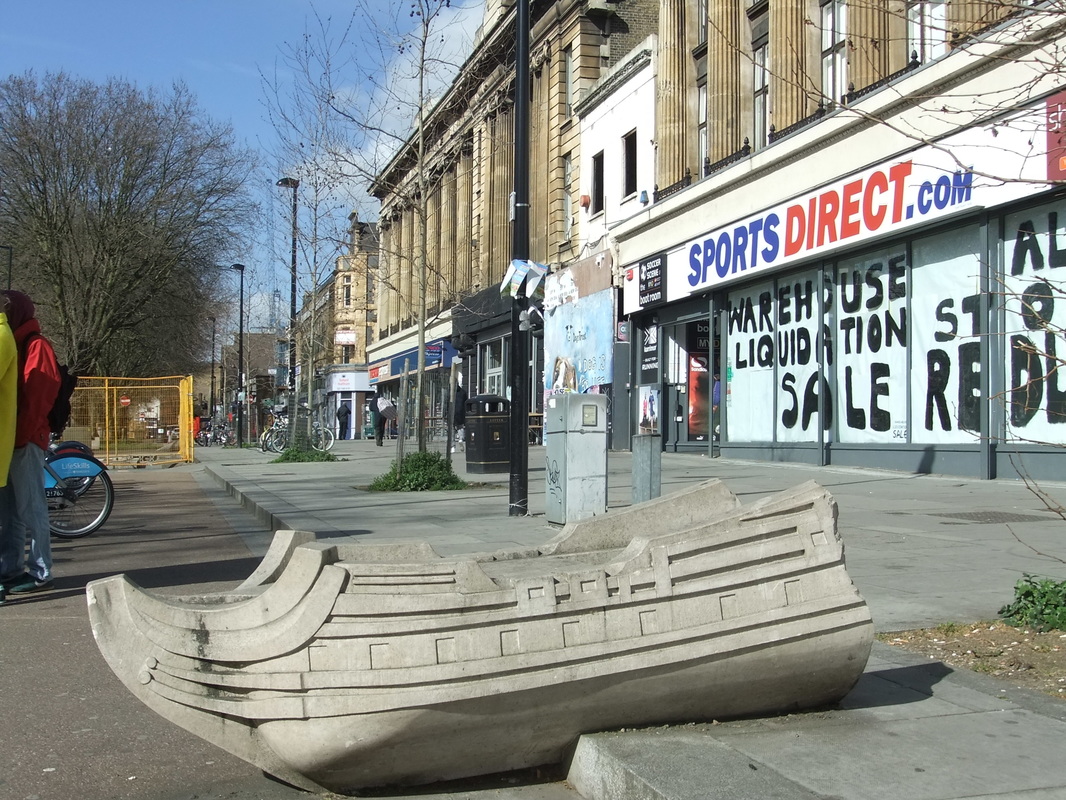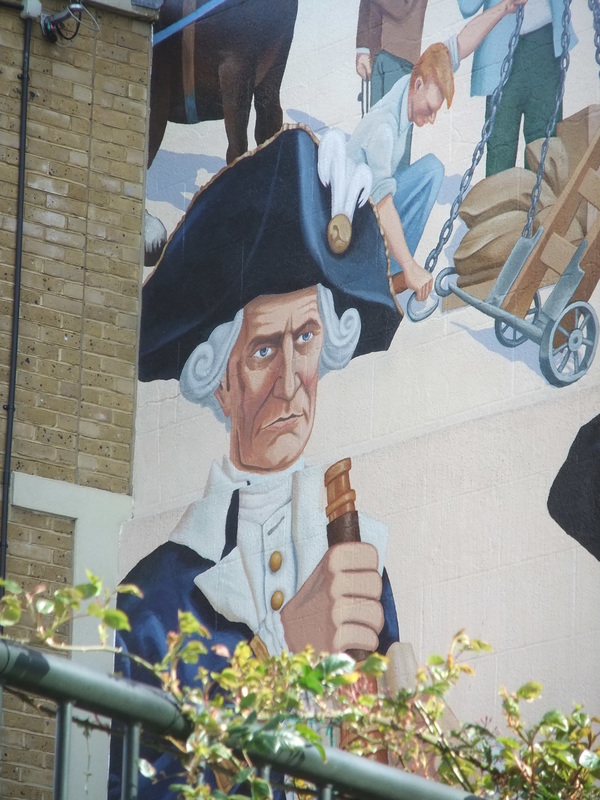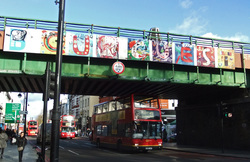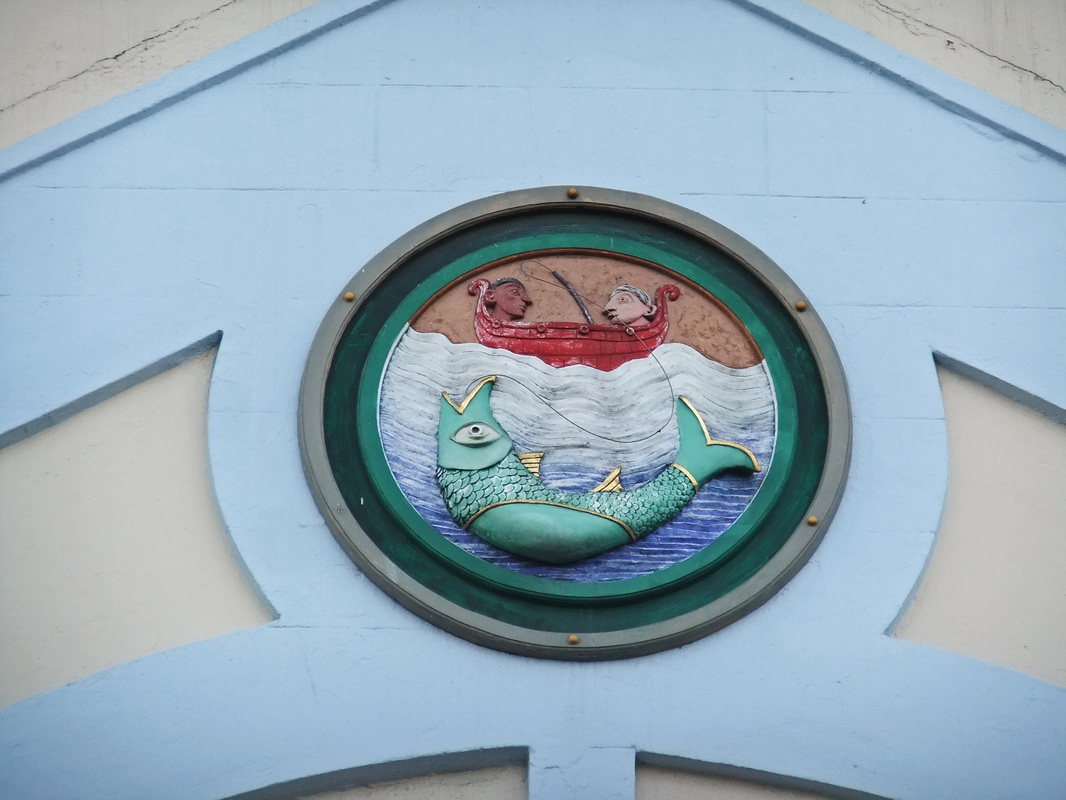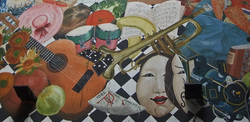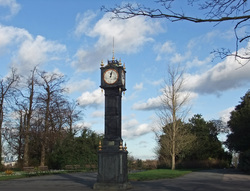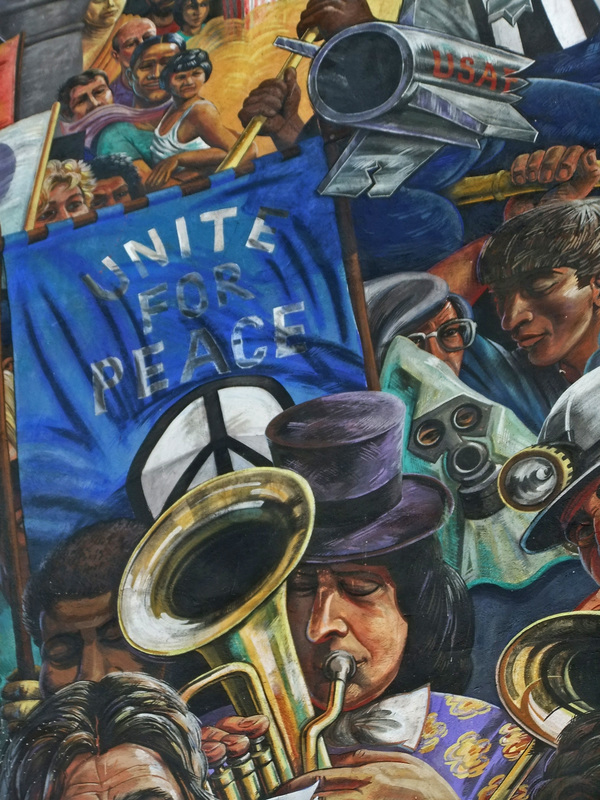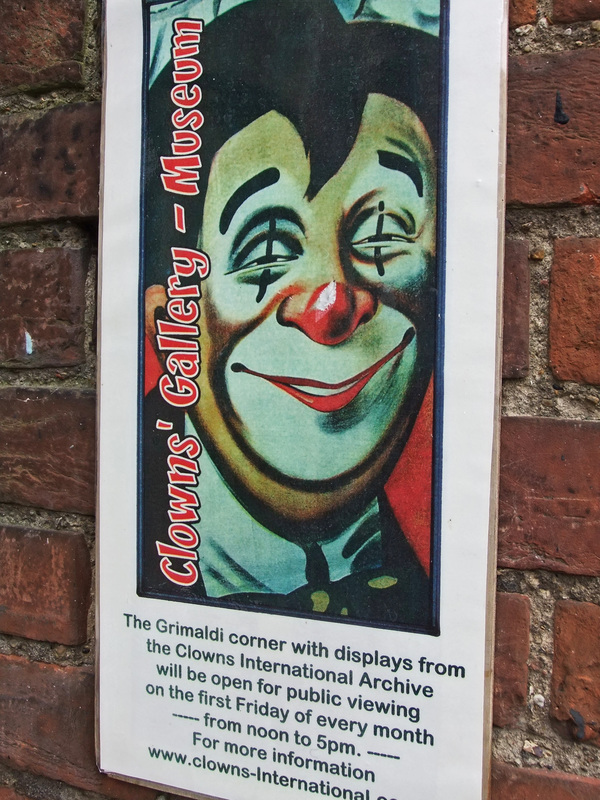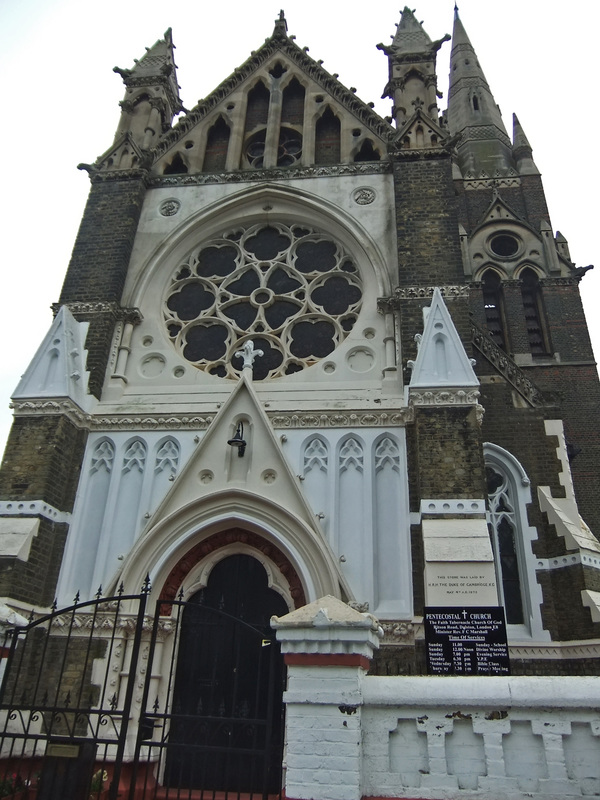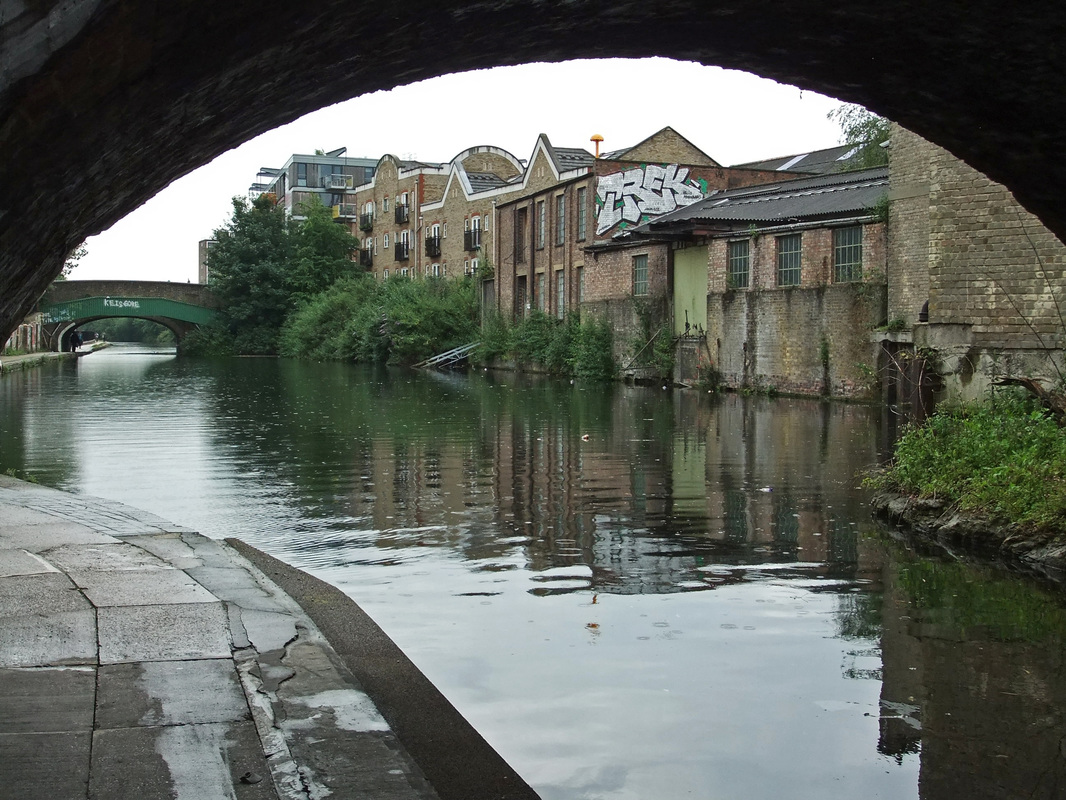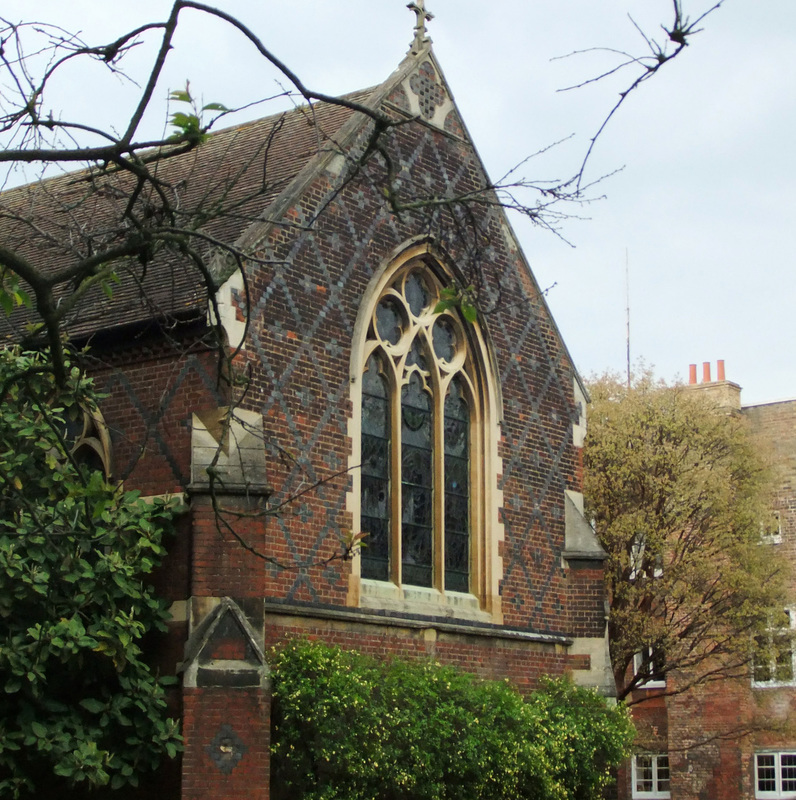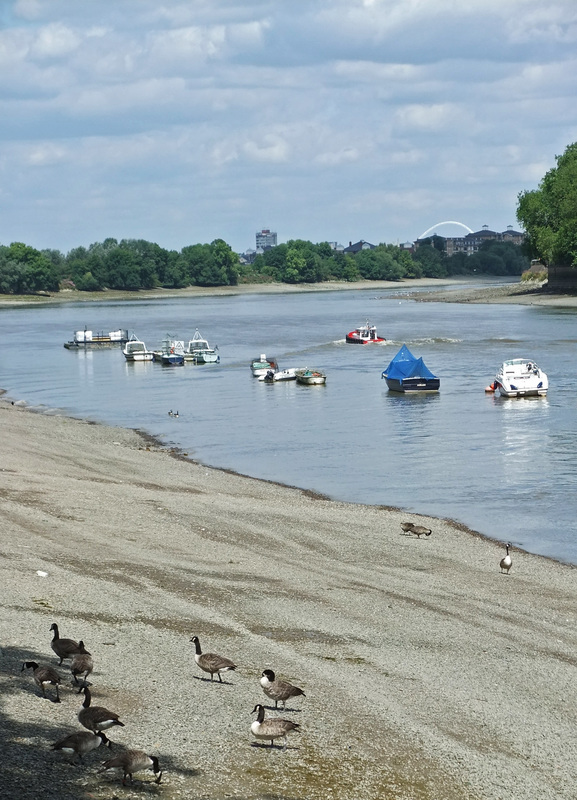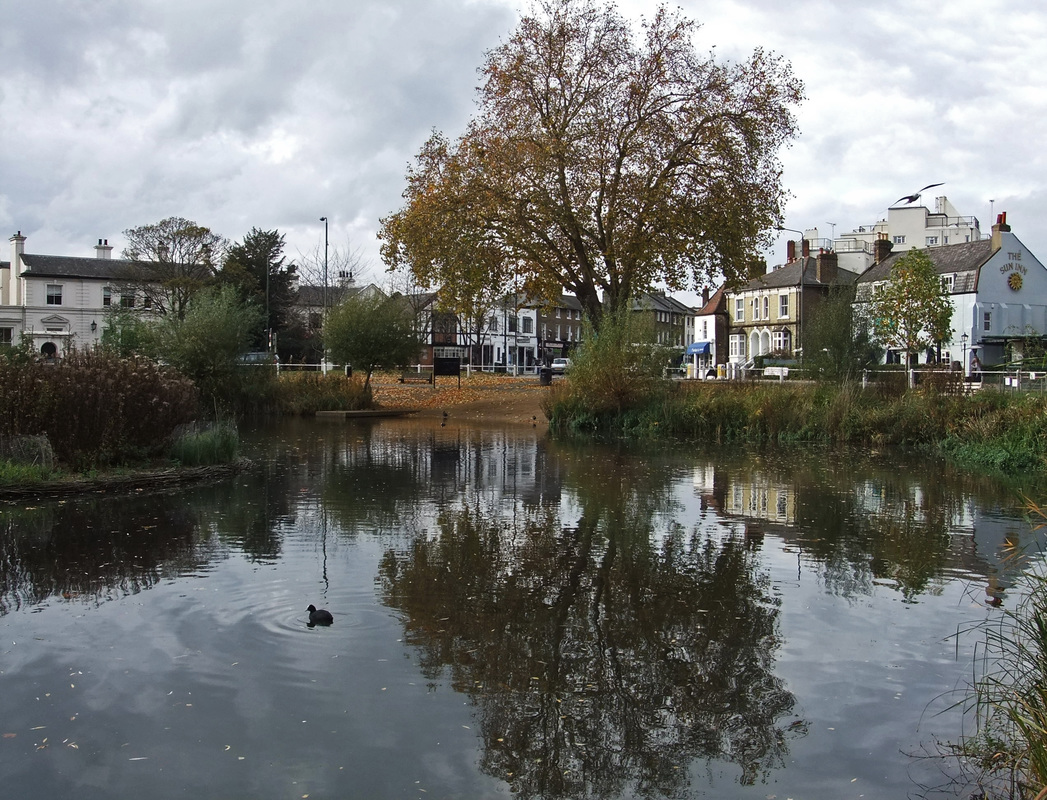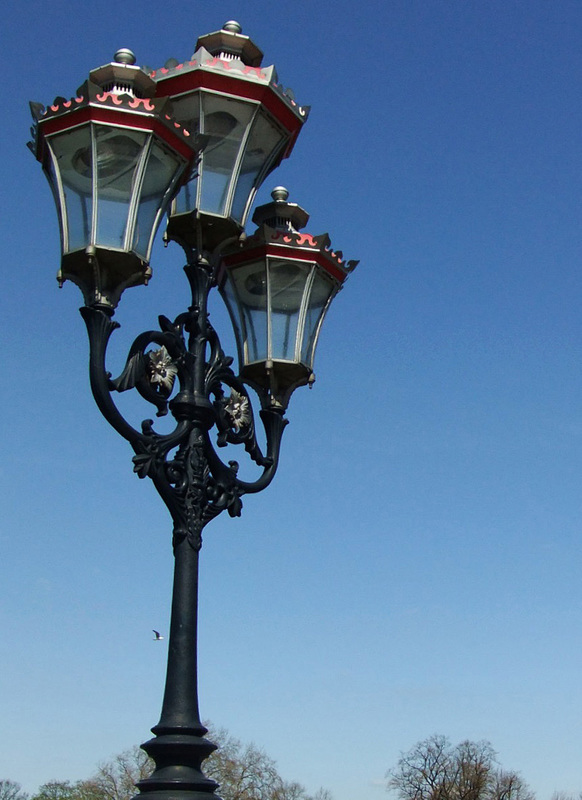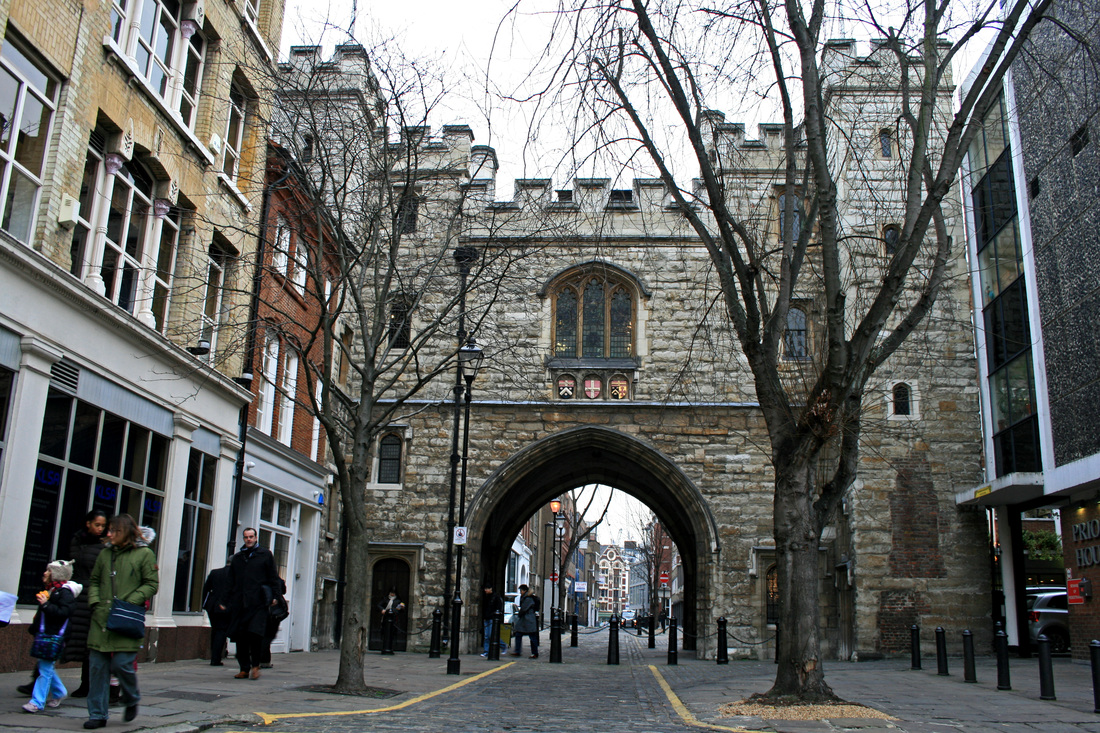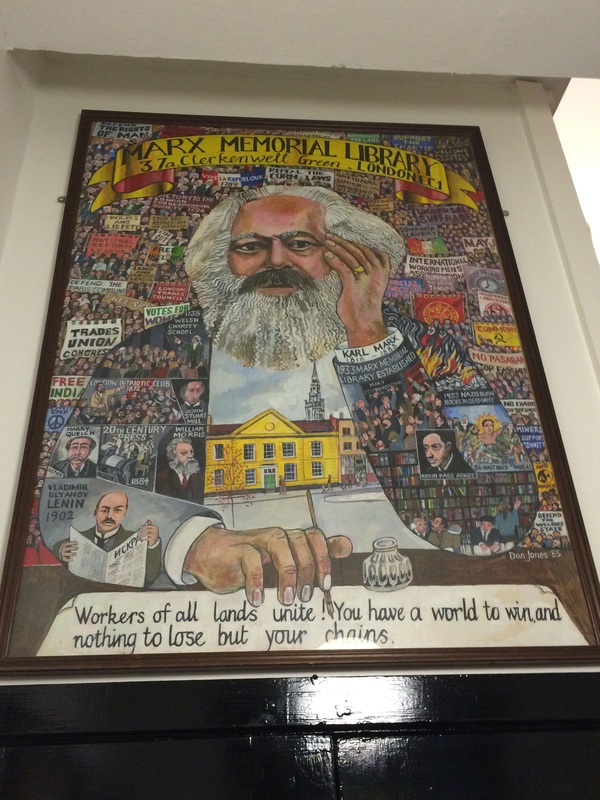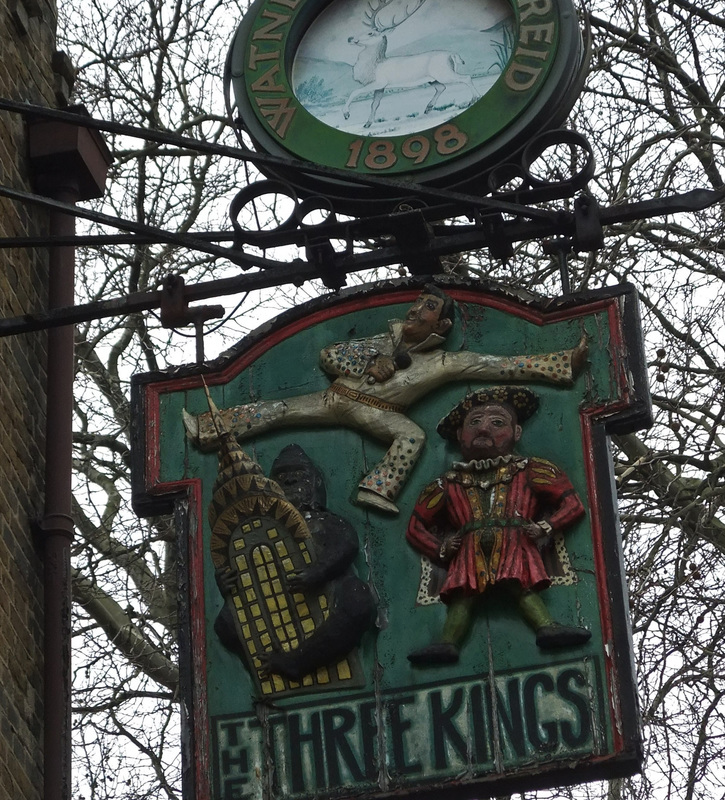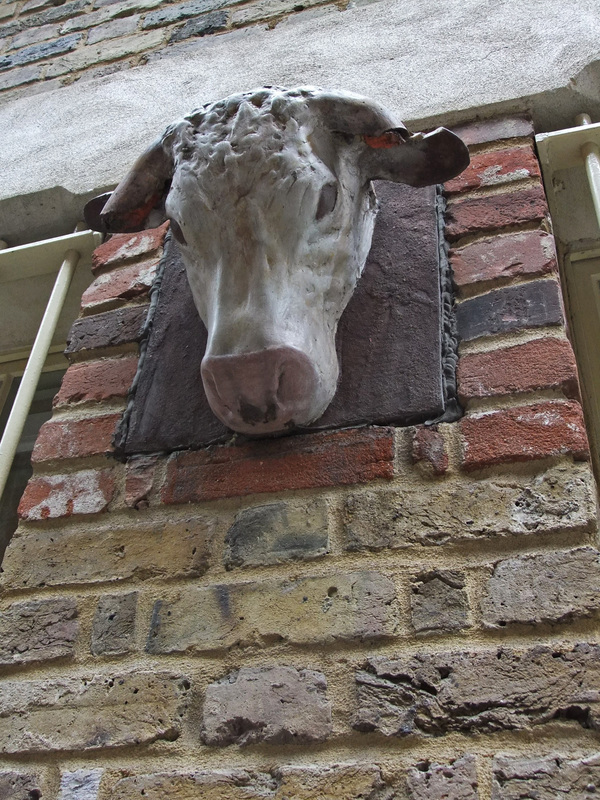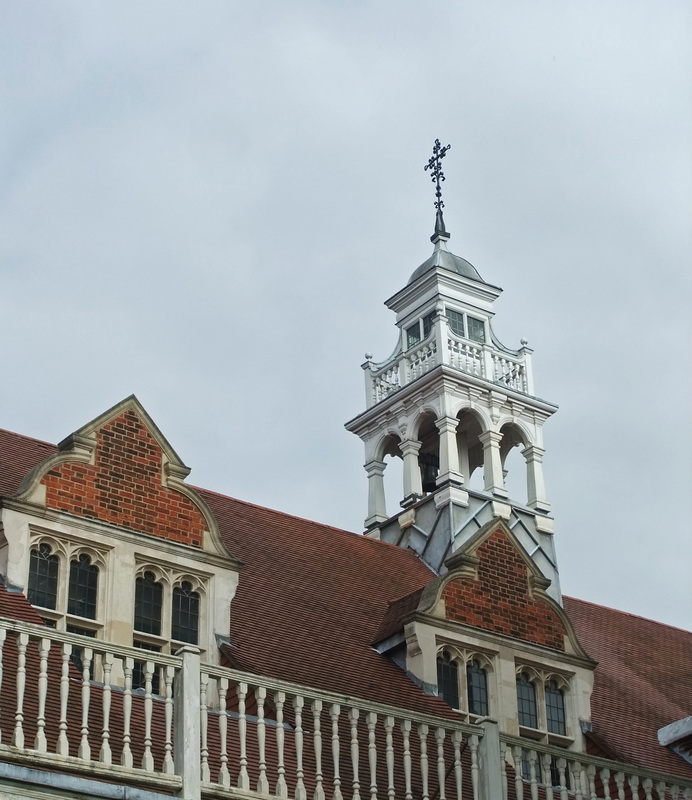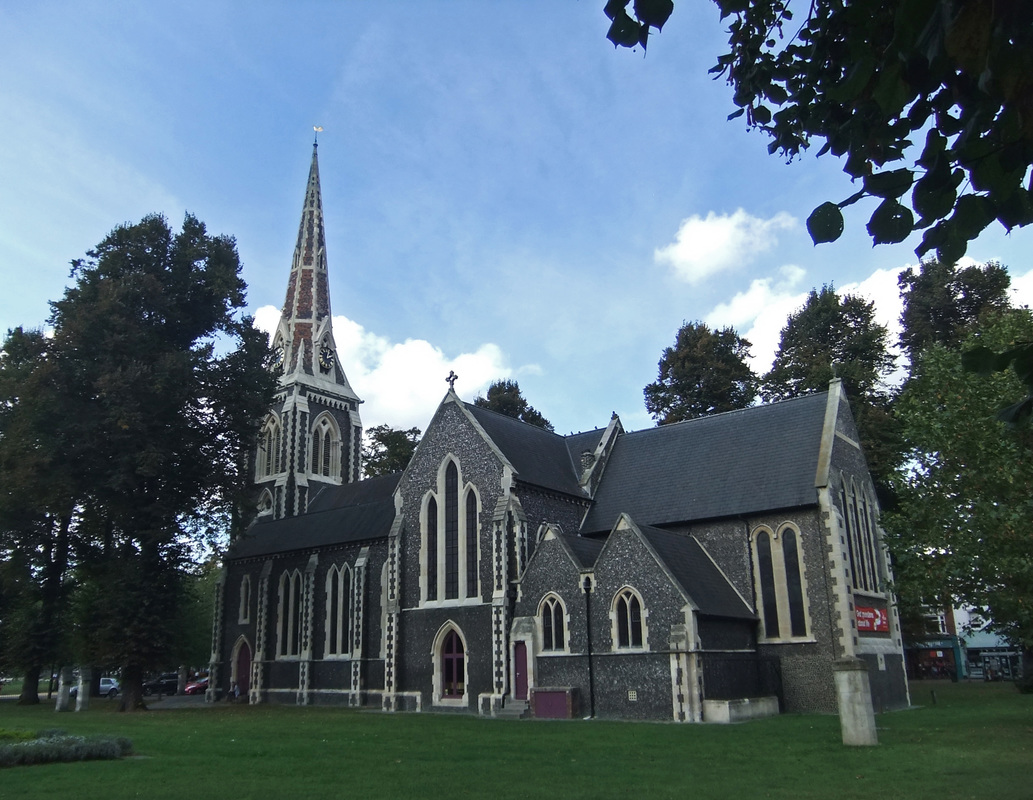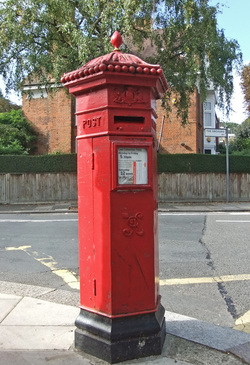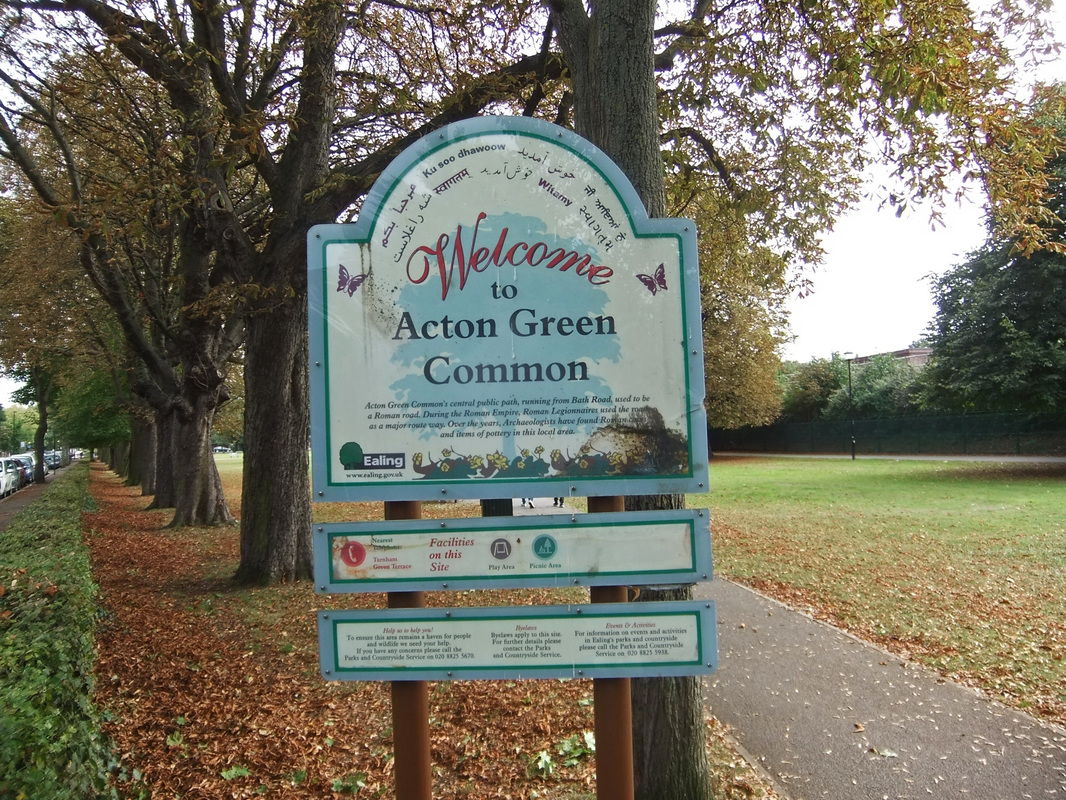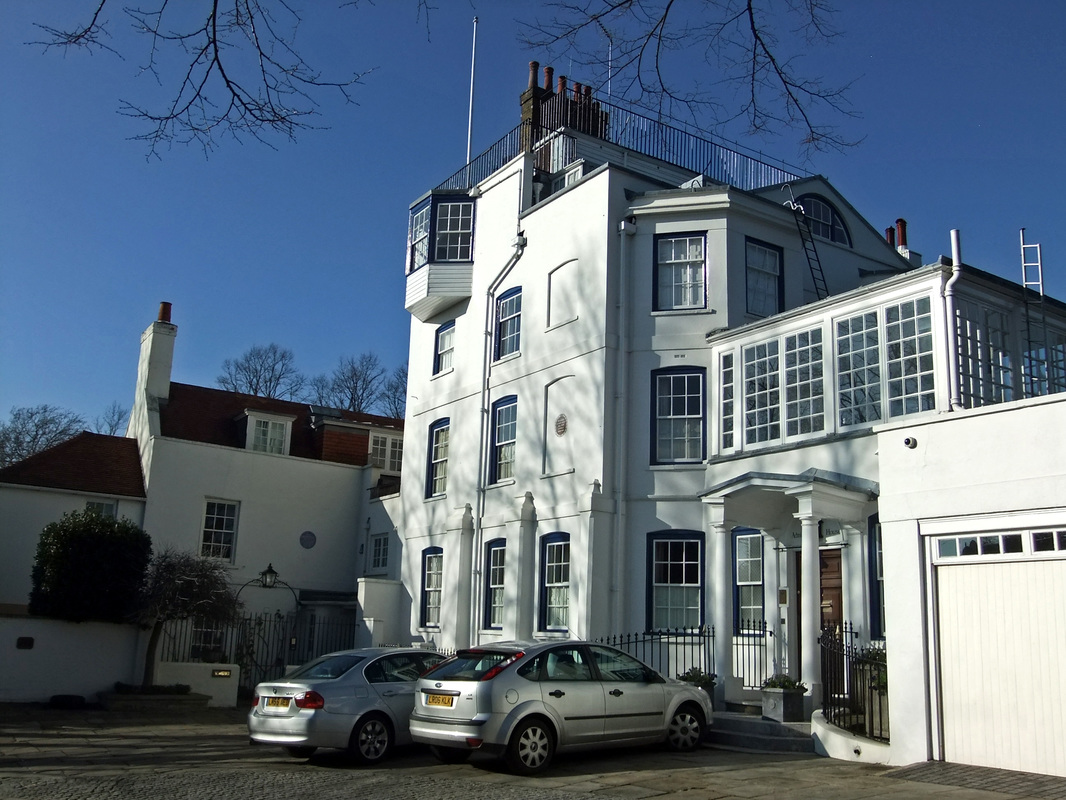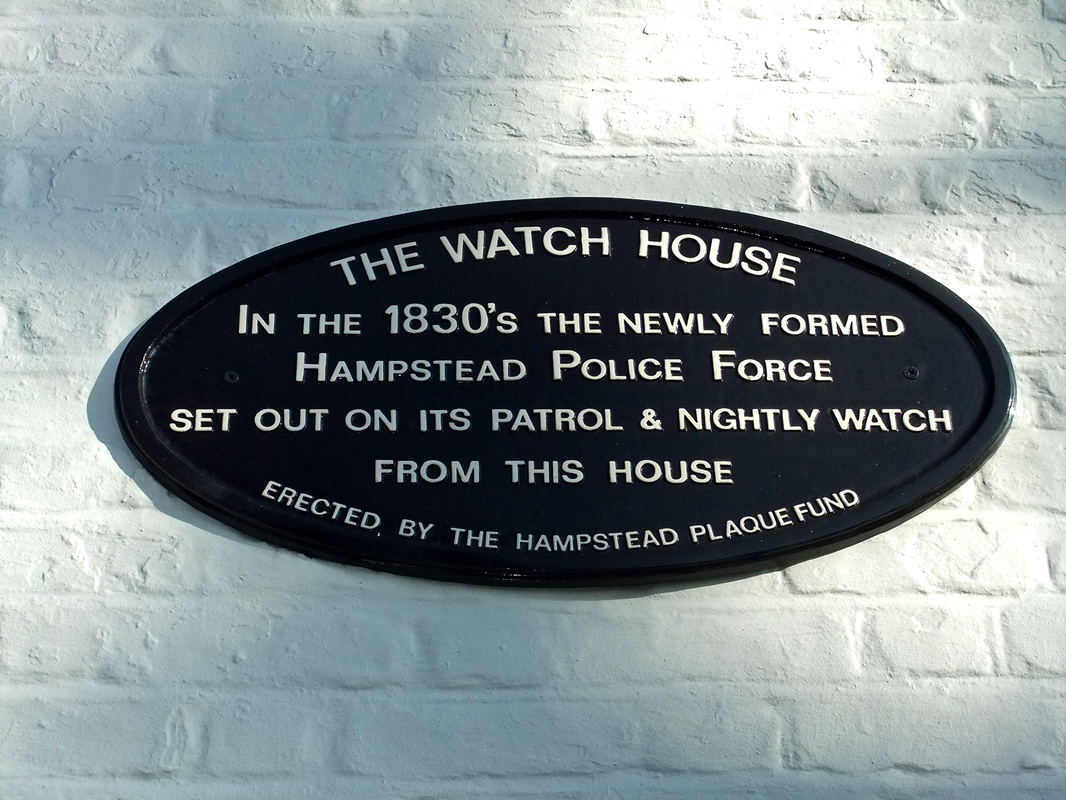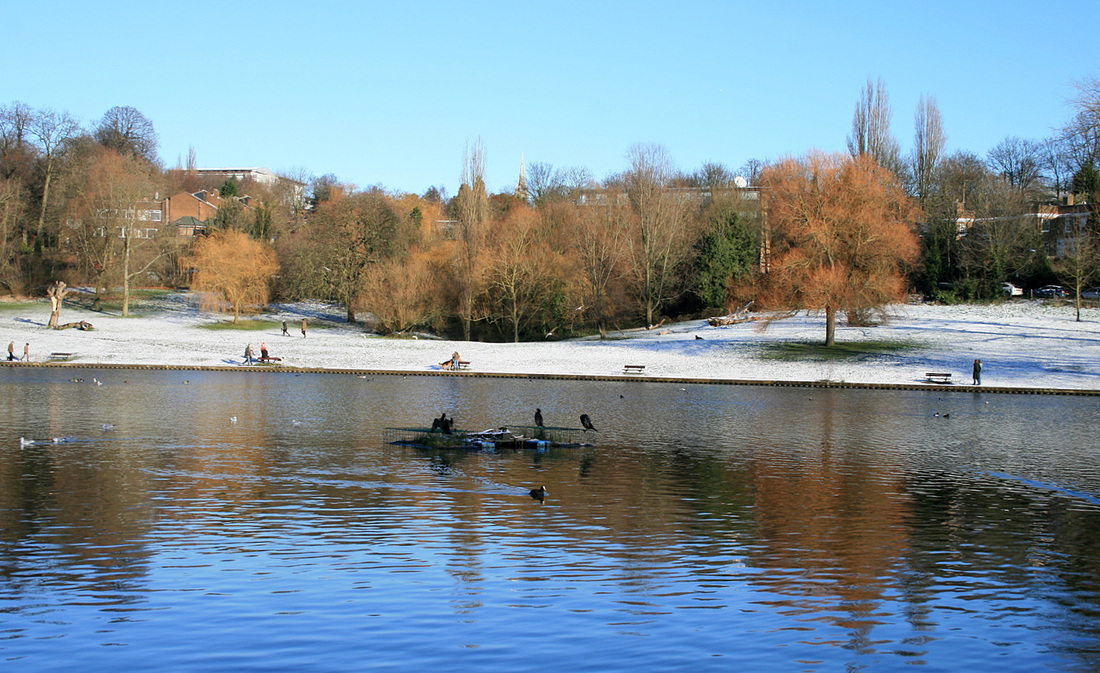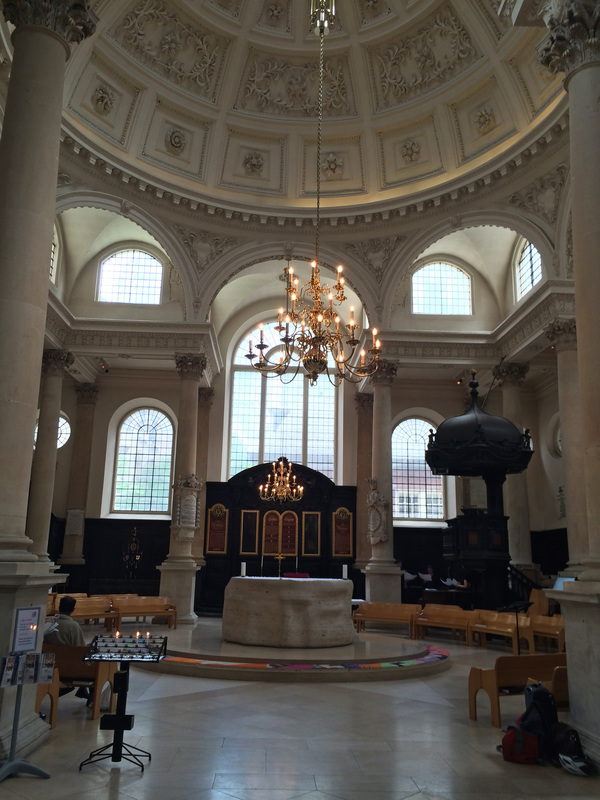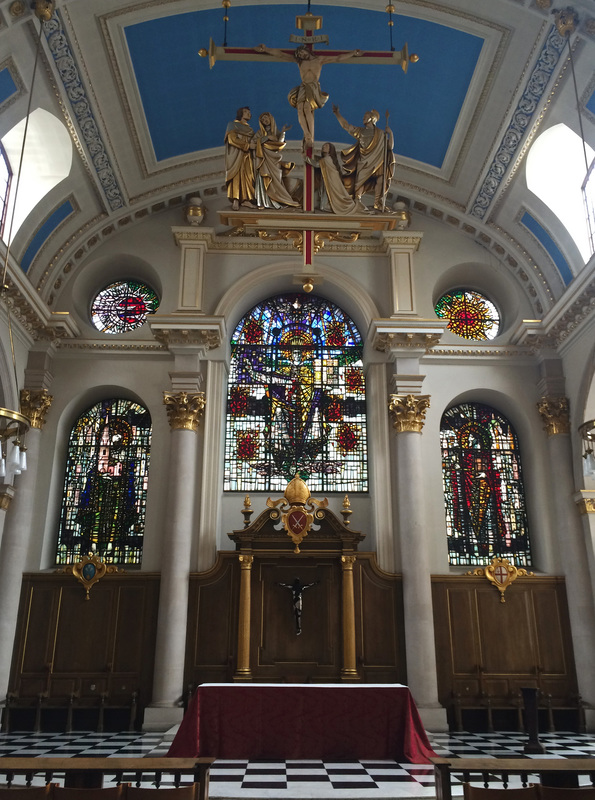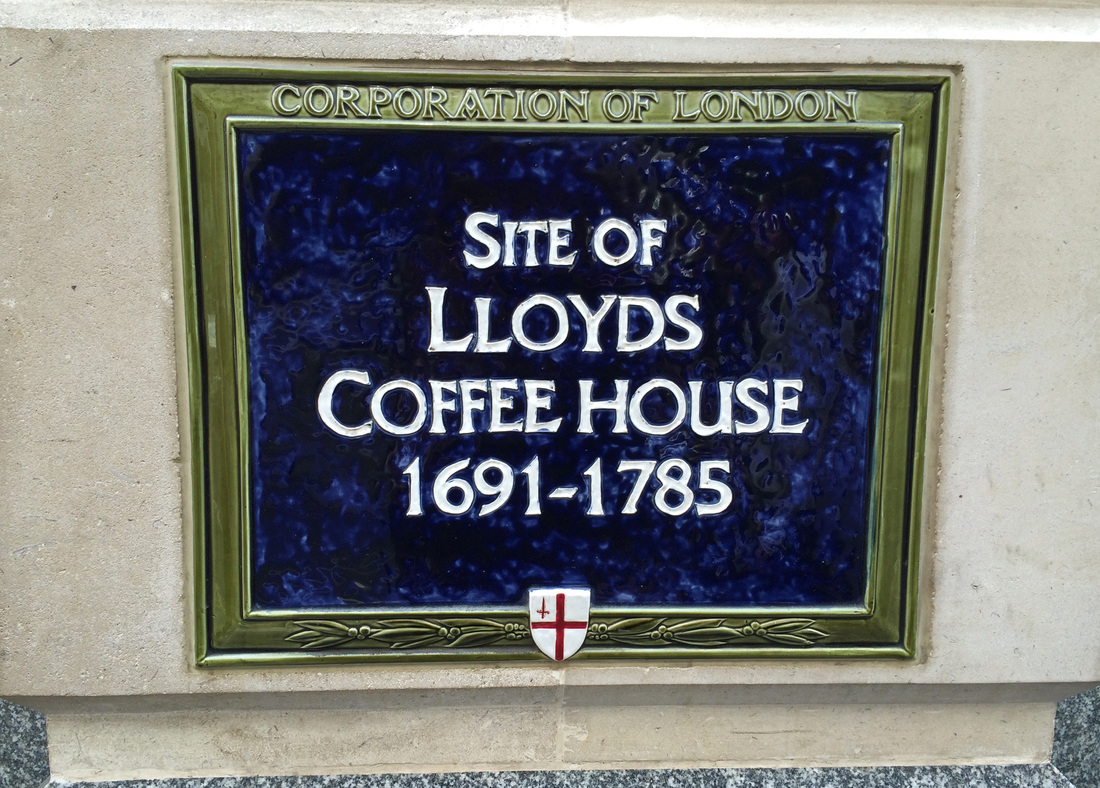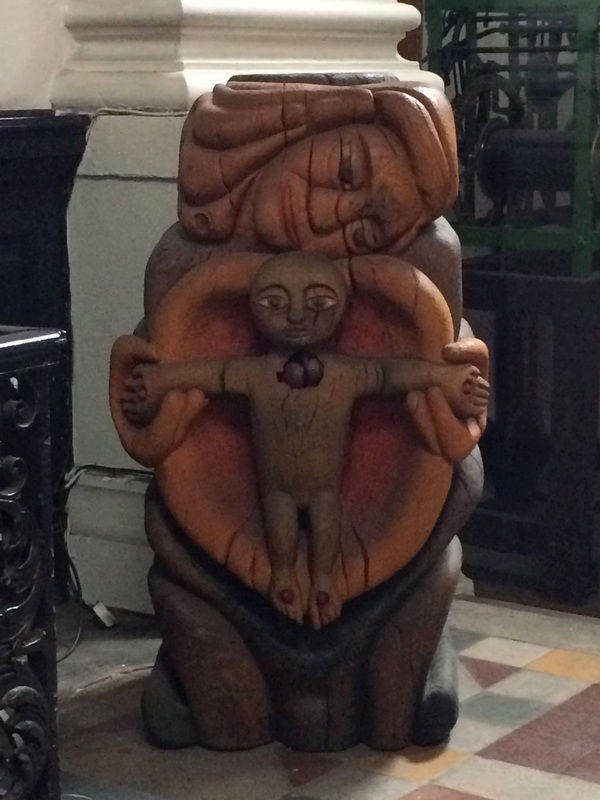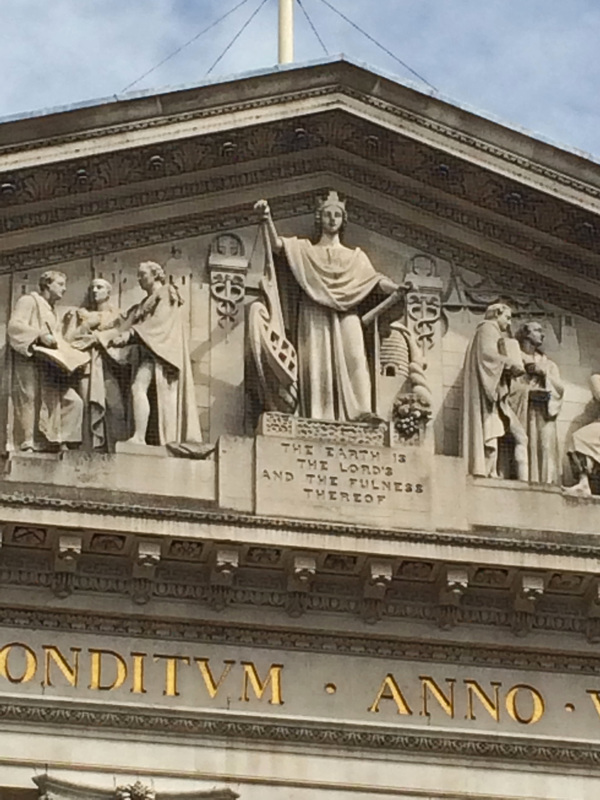VOCABULARY
|
Stepney Green: Saturday 23rd April 2016
|
Adjectives: Musty (adjective) (mustier; mustiest): Having an unpleasant old or wet smell because of a lack of fresh air. E.g. We saw a vintage clothes sale in an old warehouse and it smelt musty as we walked past. Mind-boggling (adj) (inf): Difficult to imagine, understand or believe. E.g. Mind-boggling amounts of money was being uses. Tame (adj): Used about animals or birds. Not wild or afraid of people. E.g. The goats and chickens in Stepney City Farm were very tame. They let people stroke and feed them. To tame (verb): To bring something wild under your control. To make something tame. Wild (adj): Used about animals or plants. Living or growing in natural conditions, not looked after by people. E.g. Wild animals etc. Domestic (adj): Used about animals. Animals that are kept as pets. Not wild. E.g. We have two pets - a cat and a dog. Wet (adj): a) Covered in a liquid, especially water. E.g. Wet clothes / hair / grass. E.g. Don't get your feed wet. Different ways to say something happens every two weeks: Fortnightly Every two weeks Every other week Common English exclamations:
Oi Phew Wow |
Weather:
Nippy (adj): Chilly, cold. E.g. It's a bit nippy this morning. A nip in the air (noun): Chilly (adj): Too cold to be comfortable. E.g. It was chilly when we met at Stepney Green. We needed our coats on. A chill in the air (noun): E.g. There was a chill in the air when we walked around Stepney Green. Idioms and Phrasal Verbs (plus related words):
To blow someone's mind (idiom) (inf): If something 'blows your min,' you are very excited or surprised by it. E.g. That film really blew my mind. To chat (someone) up (phrasal verb) (Brit inf): To talk to somebody in a friendly way because you are sexually attracted to them. E.g. The barman chatted her up instead of getting her a drink. To look after (somebody / something / yourself) (idiom): To be responsible for or take care of somebody / something / yourself. E.g. I want to go back to work if I can find somebody to look after the children. E.g. Inma looks after the children in an English family in Dulwich. To spring up (phrasal verb): To appear or develop quickly or suddenly. E.g. New cinemas are springing up everywhere. E.g. Harry has really sprung up since I last saw him. How old is he now? Wow! Eight years old! Offspring (noun) (formal): children. To hand something down (to somebody) (phrasal verb): a) To pass clothes, toys, etc., from older children to younger ones in the family. E.g. b) To pass customs etc., from older people to younger ones. E.g. These stories have been handed down from generation to generation. Hand-me-downs (noun): Items of clothes or toys etc., that are passed on from older children to younger children usually in a family. E.g. I didn't like being the youngest child in my family because I had all the hand-me-downs. |
Mixed vocab:
A borough (noun): An administrative division of London. E.g. There are 32 boroughs in London (plus the City of London which has its own administration). Evens (adj): Used about numbers. A number that can be divided by two: 2, 4, 6, 8, 10 etc. are even numbers. Odds (adj): Used about numbers. A number that cannot be divided by two: 3, 5, 7, 9, etc. are even numbers. To sprint (verb): To run a short distance as fast as you can. E.g. The athlete sprinted around the running track. A sprinter (noun): A person who sprints. A bit (noun): Small amount. a) (singular): slightly, a little.E.g. I was a bit annoyed with him. E.g. I'm afraid I'll be a little bit late tonight. E.g. Could you be a bit quieter, please? b) (singular): A short time or distance. E.g. Could you move forward a bit? E.g. I'm just going out for a bit. To whine (verb): To complain about something in an annoying, crying voice. E.g. The children were whining all afternoon. A grave (noun): A place where a dead body is buried. E.g. I put some flowers on my grandfather's grave. Graveyard (noun): An area of land next to a church where dead people are buried. E.g. We heard how the graveyard at St Dunston's Church was made bigger because there were so many dead sailors to bury. Cemetery (noun): A place where dead people are buried, especially a place that does not belong to a church. A gravestone (noun): A stone in the ground that shows the name, dates, etc., of the dead person who is buried there. Tomb (noun): A large place, usually built of stone under the ground, where the body of an important person is buried. A path / pathway (noun): A way across a piece of land that is made by or used by people walking. E.g. the garden path. Footpath (noun): A path for people to walk on. E.g. A public footpath. |
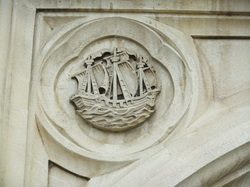
Adjectives:
Musty (adjective) (mustier; mustiest): Having an unpleasant old or wet smell because of a lack of fresh air. E.g. We saw a vintage clothes sale in an old warehouse and it smelt musty as we walked past.
Mind-boggling (adj) (inf): Difficult to imagine, understand or believe. E.g. Mind-boggling amounts of money was being uses.
Tame (adj): Used about animals or birds. Not wild or afraid of people. E.g. The goats and chickens in Stepney City Farm were very tame. They let people stroke and feed them.
To tame (verb): To bring something wild under your control. To make something tame.
Wild (adj): Used about animals or plants. Living or growing in natural conditions, not looked after by people. E.g. Wild animals etc.
Domestic (adj): Used about animals. Animals that are kept as pets. Not wild. E.g. We have two pets - a cat and a dog.
Wet (adj): a) Covered in a liquid, especially water. E.g. Wet clothes / hair / grass. E.g. Don't get your feed wet.
b) Used about the weather, with a lot of rain. E.g. It was wet all day (= it rained all day)
Dry (adj): (opposite to 'wet') a) Not Wet: Without liquid in it or on it. E.g. The washing isn't dry yet.
b) Without rain. Having little or no rain. E.g. A hot, dry summer.
Higgledy-piggledy (adj and adv): Not in any order. Mixed up together. E.g. She keeps her clothes higgledy-piggledy in her drawers. E.g. Some streets are all higgledy-piggledy. There are tall houses, short houses, old houses, new ones etc.
Touristy (adj): A place visited by lots of tourists. E.g. Central London is very touristy.
A tourist guide = an information book about a place that has been published for tourists.
Musty (adjective) (mustier; mustiest): Having an unpleasant old or wet smell because of a lack of fresh air. E.g. We saw a vintage clothes sale in an old warehouse and it smelt musty as we walked past.
Mind-boggling (adj) (inf): Difficult to imagine, understand or believe. E.g. Mind-boggling amounts of money was being uses.
Tame (adj): Used about animals or birds. Not wild or afraid of people. E.g. The goats and chickens in Stepney City Farm were very tame. They let people stroke and feed them.
To tame (verb): To bring something wild under your control. To make something tame.
Wild (adj): Used about animals or plants. Living or growing in natural conditions, not looked after by people. E.g. Wild animals etc.
Domestic (adj): Used about animals. Animals that are kept as pets. Not wild. E.g. We have two pets - a cat and a dog.
Wet (adj): a) Covered in a liquid, especially water. E.g. Wet clothes / hair / grass. E.g. Don't get your feed wet.
b) Used about the weather, with a lot of rain. E.g. It was wet all day (= it rained all day)
Dry (adj): (opposite to 'wet') a) Not Wet: Without liquid in it or on it. E.g. The washing isn't dry yet.
b) Without rain. Having little or no rain. E.g. A hot, dry summer.
Higgledy-piggledy (adj and adv): Not in any order. Mixed up together. E.g. She keeps her clothes higgledy-piggledy in her drawers. E.g. Some streets are all higgledy-piggledy. There are tall houses, short houses, old houses, new ones etc.
Touristy (adj): A place visited by lots of tourists. E.g. Central London is very touristy.
A tourist guide = an information book about a place that has been published for tourists.
Brixton: Wednesday 13th April 2016
Dalston: Saturday 12th December 2015
|
General Vocab:
Bric-a-brac (noun): Small items of little value, usually for decoration in a house. Often second hand. To shout (something at/to somebody) (shout something out) (verb): To say something in a loud voice. E.g. We heard lots of people in the market shouting out the prices of vegetables and other goods. To call out (phrasal verb): To say something in a loud voice. Announce something. E.g. As we walked through the market, we heard several stall holders call out what they were selling. To scream (something) (out) (at somebody) (verb): To cry out loudly in a high voice because you are afraid, excited, angry, in pain etc. E.g. She saw a mouse and screamed out. E.g. She screamed at the children to stop making so much noise. E.g. He screamed with pain after the car accident. A towpath (noun): A path beside a river or canal, originally used as a pathway for horses towing barges (= a long flat-bottomed boat for carrying freight on canals and rivers). To tow (something) (verb): To pull a car or boat behind another vehicle, using a rope or chain. E.g. My car was towed away by the police. In tow (idiom) (informal): Following closely behind. E.g. He arrived with his wife and five children in tow. To remind (verb): a) To help somebody to remember something, especially something important that they have to do. E.g. Can you remind me of your address? He reminded the children to wash their hands before dinner. b) To cause somebody to remember something. E.g. That smell reminds me of school. E.g. You remind me of your father. Derelict (adjective): No longer used and in bad condition. E.g. A derelict house. A snippet (noun): A small piece of something, especially information or news. E.g. I heard an interesting snippet on the radio this morning. E.g. I really like listening to snippets of conversation when I’m on a bus. To budge (verb): a) To move or make something move a little. E.g. I tried to move the cupboard to the other side of the room, but it wouldn't budge. E.g. We just couldn't budge the car when it got stuck in the snow. b) To change or make somebody change a firm opinion. E.g. Neither side in the dispute is prepared to budge. A demonstration (against / for somebody / something (noun): A public protest for / against somebody/thing. E.g. A demonstration against a new law. A demo (noun) (British informal): E.g. All of us are going on the demo this Saturday. A banner (noun): A long piece of cloth with words or signs on it, which can be hung up or carried on two poles. E.g. The demonstrators carried banners saying 'Stop the War.' A leaflet (noun): A printed piece of paper that gives information about something. Leaflets are usually given free of charge. E.g. I picked up a leaflet advertising a new language club. A flyer (noun): A small sheet of paper that advertised a product or an event and is given to a large number of people. To sort (something) (verb): a) to sort something into something = to put things into different groups or places, according to their type, etc. To separate things of one type from others. E.g. I'm just sorting these papers into the correct files. b) (especially British informal). To find an answer to a problem or difficult situation; to organise something/body. E.g. I'll have more time when I've got things sorted at home. Community spirit (noun): Friendliness and understanding between local people. A willingness and desire to participate in activities that promote and help a community. Brutal (adjective): Very cruel and/or violent. E.g. The police are investigating a brutal murder.
Brutally (adverb): He was brutally honest and told her that he didn't love her anymore. E.g. In the past, St Mark's church was described as 'brutally ugly'. Hair of the dog (expression): The belief that by having a small drink of alcohol when you have a hangover, it will cured. Stubborn (adjective): Not wanting to do what other people want you to do. Refusing to change your plans or decisions. E.g. She's too stubborn to apologise. Stubbornly (adverb): E.g. He stubbornly refused to apologise so he was sacked. Synonyms: Obstinate (adjective): Refusing to change your opinions, way of behaving, etc., when other people try to persuade you to. E.g. An obstinate refusal to apologise. Obstinately (adverb): She obstinately refused to consider giving an apology. Pig-headed (adjective) (informal): Not prepared to change your mind or say that you are wrong. Stupidly obstinate. E.g. They were to pig-headed to listen to us. Now they've lost their jobs. Pig-headedness (noun): E.g. It was her pig-headedness that got her into trouble. To drop out (of something) (phrasal verb): To not do something that you were planning to do. Or stop doing something before you’ve completely finished it. E.g. Two people have dropped out of today’s walk. |
Gardens & Plants:
A flower bed (noun): A piece of ground in the garden or park where flowers are grown. E.g. She planted loads flowers in the flower beds last summer. A raised (flower) bed (noun): A flower bed that has been built (raised) above the surface of the ground. Raised beds usually have a border around them of wood or stones. Often, they are used to grow vegetables. E.g. We saw several raised beds in Dalston Eastern Curve Garden. A bush (noun): A plant like a small, thick tree with many low branches. E.g. A rose bush. A shrub (noun): A small bush. A hedge (noun): A row of bushes or trees planted close together at the edge of a garden or field to separate one piece of land from another. Some adjectives we used to describe Ridley Road Market:
To bustle (verb): a) To move in a busy, noisy or excited way. E.g. He bustled about the kitchen making tea for us. b) To bustle (with something): To be full of people, noise or activity. E.g. The streets were bustling with shoppers. Bustling (adj): E.g. Ridley Road Market is a bustling market. E.g. It was a bustling little town. Vibrant (adj): Full of life and energy. (we also use 'vibrant' for colours = bright and strong) Packed (adj): Extremely crowded. E.g. Get there early, because the market is absolutely packed by the afternoon. Colourful (adj): With bright colours, full of colour. E.g. Because there are so many different cultures in Dalston, the market is wonderfully colourful. Noisy (adj) (noisier, noisiest): Making a lot of, or too much, noise. Full of noise. E.g. The market was so noisy that we couldn't hear each other talk. Lively (adj): Full of energy, interest, excitement etc. E.g. Ridley Road is so lively when the market's open. Smelly (adj) (smellier, smelliest) (informal): Having a bad smell. If we want to describe specific types of odours and smells, we can add a 'y' to a noun. E.g. A fishy smell A meaty smell A fruity smell. And we smelt all of those in the market! Mad related vocab:
Asylum (noun): a) Protection that a government gives to people who have left their own country for political reasons. E.g. To give somebody political asylum. An asylum = In the past, we called psychiatric hospitals (=hospitals for people with mental health problems), an asylum. E.g. In the past, De Beauvoir's house became an asylum. Barmy (adjective) (informal): a) Mad, crazy. E.g. I thought I was going barmy when I couldn't find my purse. b) Foolish. E.g. What a barmy decision our manager made. Mad (adjective): a) Having a mind that does not work normally. Mentally ill. b) Stupid (British informal). Not at all sensible; stupid. E.g. You must be mad to drive in this weather. c) Angry (mad at/with somebody) (about something) Very angry. E.g. His stubbornness drives me mad! d) Very interested (informal) (mad about/on somebody/thing). Liking somebody/thing very much. E.g. He's mad on computer games at the moment. E.g. Steve's mad about Maria. e) Wild. Not controlled, wild or very excited. E.g. The audience was cheering and clapping like mad (= very hard). E.g. When the James Bond stars appeared at the cinema, their fans went mad. |
Barnes Bridge to Fulham Palace: Saturday 28th November 2015
|
General vocab:
A lodge (noun): A small house in the country or the small room or house at the entrance to a large building. To lodge (verb): To pay to live in somebody's house with them. E.g. He lodge with a family for his first term at university. (a lodger = noun) To board (verb): as above. E.g. He boarded with his aunt and uncle for his first year at university. A boarder (noun): a) A person who pays to live at somebody's house. b) A child who lives at school and goes home for the holidays. Note: 'to lodge' and 'to board' has been mostly replaced with 'to rent'. A scooter (noun): a) A child's toy with two wheels that you stand on and move by pushing one foot against the ground (there are also a lot of adults using scooters too!). b) A light motorbike with a small engine. A moped (noun): A type of small, not very powerful motorbike. A bookend (noun): A support placed at the end of a row of books to keep them upright. Often, there is a book end at both ends of the books. To bookend (something) (verb): To be positioned at the end or on either side of something. E.g. Two churches bookend Putney Bridge (= there is a church at the north end of the bridge in Fulham; and there is another church at the south end in Putney). Rhubarb (noun): A plant with red stalks (= the long thin parts) that can be cooked and eaten as fruit.
A crumble (noun): A pudding made with crumble (= a mixture of flour, butter and sugar that is rubbed to the texture of breadcrumbs) and fruit. E.g. Rhubarb crumble is one of my favourite puddings! Delicious! To fling (something) (verb): To throw something/body suddenly and carelessly or with great force. E.g. He flung his coat on the floor. E.g. She flung herself off the bridge. To re-do (something) (verb): To do something again, perhaps because it wasn't done well enough the first time. E.g. The manager told me to re-do the report because I'd missed out too much information. A brooch (noun): A piece of jewellery with a pin at the back that usually women wear on their clothes. Wasted (adjective): a) Suffering from the effects of drink or drugs. E.g. She was wasted by the time she left the party. b) Not necessary or successful. E.g. A wasted journey. c) Very thin, especially because of illness. E.g. When I visited her at the hospital, she looked so wasted. She's wasting away (= getting thinner) To splash out (on something) (phrasal verb) (informal): To spend money on something that is expensive and that you not really need. A spree (noun): A short time that you spend doing something you enjoy, often doing too much of it. E.g. to go on a spending/shopping spree. To toast (ourselves): Warm ourselves or part of our body in front of a fire or other source of feet. E.g. Lilliana was toasting her feet by the fire. |
Churchyard related vocabulary:
To bury (verb) (pt, pp buried): a) To put a dead body in the ground. E.g She wants to be buried in the village graveyard. b) To put something in a hole in the ground and cover it. E.g. Our dog always buries its bones in the garden. c) To cover or hide something. E.g. At last I found the photos. They were buried at the bottom of a cupboard. A graveyard (noun): An area of land next to a church where dead people are buried. A grave (noun): The place where a dead body is buried. A gravestone (noun): The stone in the ground that shows the name, dates, etc., of the dead person who is buried there. Vocab related to the interiors of buildings:
The skirting / skirting board (noun): The wooden board that runs along the base of an interior wall (the point where the wall meets the floor). E.g. Don't forget to paint the skirting board yellow when we decorate the lounge. A pelmet (noun): A narrow border of cloth (or wood) that fits across the top of a window (above the curtains) to hide the curtain fittings (=the rail and hooks that hold up the curtains) A floorboard (noun): One of the long wooden boards used to make a floor. E.g. The new house has polished floorboards in the lounge. We can buy a lovely new rug to go on top. Floor tiles (noun): A thin, square slab of ceramic, faux wood, marble, etc. for covering the floor. Carpet (noun): A piece of thick material that is used for covering floors and stairs. E.g. A fitted carpet (=one that is cut to the exact shape of a room). A rug (noun): A piece of thick material that covers a small part of a floor. A girder (noun): A long, heavy piece of iron or steel that is used in the building of bridges, large buildings etc. A beam (noun): A long piece of wood, metal, etc., that is used to support weight. E.g. in the floor or ceiling of a building. We often can see the original wooden beams in old pubs (the black wooden beams down the walls and across the ceilings) Ceiling (noun): The top surface of the inside of a room. E.g. A room with a high/low ceiling. A cove / the coving (noun): The arch formed at the junction of a wall and a ceiling. The cornice (noun): The ornamental moulding round the wall of a room just below the ceiling. To refurbish (verb): To clean and decorate a room, building, etc., in order to make it more attractive, more useful. E.g. The hotel is closed while they're refurbishing it. To restore (verb): To put something back into its former condition or position. E.g. The house is in need of restoration. To reconstruct (verb): To build again something that has been destroyed or damaged. E.g. The Olympic Studios in Barnes have been reconstructed to become a cinema again. |
Collapse related vocabulary:
A buckle (noun): A piece of metal or plastic at the end of a belt or other narrow piece of material that is used for fastening. E.g. The child bucked (up) shoes. To buckle (verb): a) To fasten or be fastened with a buckle. b) To become crushed or bent because of heat, force, weakness, etc. To crush or bend something in this way. E.g. Some railway lines buckled in the heat. E.g. She buckled under the weight of her bag. To collapse (verb): a) (a thing) To fall down or break into pieces suddenly. E.g. We saw an old house in Barnes that had collapsed. b) (a person) To fall down, usually because you are very ill, and perhaps become unconscious. E.g. The winner collapsed at the end of the race. To faint (verb): To become unconscious. E.g. She fainted when she heard the bad news. To pass out (phrasal verb): (more common than 'collapse/faint') To become unconscious. E.g. He passed out when he arrived at work. He hadn't been feeling well for ages. Using 'dead' as emphasis:
Dead (only before a noun) Complete or exact. E.g. A dead silence. E.g. It was dead calm. (before adjectives) As emphasis (informal) E.g. They were dead clever. E.g. It was dead boring. E.g. It was dead expensive. Building waste related vocabulary: Debris (noun): Pieces from something that have been destroyed. E.g. After the boat crashed, we found loads of pieces of wood on the beach. In fact, there was debris everywhere. Waste materials / waste stuff Rubble (noun): Pieces of broken brick, stone etc., especially from a damaged building. |
Clerkenwell: A history of rebellion Walk – Saturday 24th October 2015
|
Different sounds vocab:
To patter (verb): To make a repeated light tapping sound. E.g. The rain pattered against the window.
A patter (noun): The sound of many quick light steps or knocks on a surface. E.g. The patter of the children's feet on the stairs. To rustle (verb): To make a sound like dry leaves or paper moving. E.g. There was a rustling noise in the bushes. E.g. When we kicked the Autumn leaves, they rustled. A rustle (noun): As above. E.g. I heard a rustle coming from the garden. To hum (verb): To make a continuous low noise. E.g. The machine began to hum as I switched it on. b) To sing with your lips closes. E.g. You can hum the tune if you don't know the words. A hum (noun): As above. E.g. The hum of machinery / distant traffic To rumble (verb): To make a deep heavy sound. E.g. I heard the thunder rumbling in the distance. E.g. I was so hungry my tummy was rumbling. A rumble (noun): As above. E.g. A rumble of thunder. Guts related vocab:
A gut (noun): The tube of the body that food passes through when it leaves the stomach. To gut (something) (verb): a) To remove the organs from inside an animal, fish, etc. E.g. After the caught the fish, they gutted it and added it to the barbecue. b) To destroy the inside of a building. E.g. The warehouse was gutted by fire. To have guts (idiom): To have courage, determination. E.g. She didn’t have the guts to tell him the truth. Note: We often use this with the verb ‘to take’. E.g. It takes guts to tell someone that they aren’t very good at their job. To hate someone’s/thing’s guts (idiom) (informal): To feel a strong hatred for someone or something. E.g. When he lost his job, he hated the company’s guts. To work your guts out (idiom): To work extremely hard. E.g. She worked her guts out for ten months, and then they made her redundant. She was so angry that she hated their guts after that! Misery / Greedy guts etc. (noun) (Brit informal): Used to give negative characteristics to people. E.g. You misery guts! You never smile anymore! E.g. Oh what a greedy guts … look how many cakes she’s eaten! To slaughter (verb): a) To kill an animal, usually for food. E.g. Cattle were brought to Smithfield Market where they were slaughtered before they were sold to markets around London. b) To kill a large number of people at one time, especially in a cruel way. E.g. Men, women and children were slaughtered and whole villages destroyed. To cull (verb): To kill a number of animals in a group to prevent the group from becoming too large. E.g. Last year in England, the government organised a cull of badgers (= an animal with black and white lines on its head that lies in holes in the ground and comes out at night). Entrails (noun): The guts of a person or animal that have been removed or exposed by violence or by a butcher. E.g. After the animals were slaughtered at Smithfield Market, the ground was covered in their entrails. |
Mixed vocab:
Gibberish (noun): Words that have no meaning or that are impossible to understand. E.g. I was so nervous in my interview I just spoke gibberish.
Rubbish (noun): a) Things that you don't want anymore. E.g. The dustmen collect the rubbish every Monday morning.
b) Something that you think is bad, silly or wrong. E.g. I thought that film was absolute rubbish. E.g. Don't talk rubbish!
A weather vane (noun): An object often on top of buildings that has an arrow that turns in the wind.
A vein (noun): One of the tubes that carry blood from all parts of your body to your heart.
To stain (verb): To leave a coloured mark that is difficult to remove. E.g. Don't spill any of that red wine - it'll stain the carpet.
Stained glass (noun): Pieces of coloured glass that are used in church windows, etc. E.g. A stained-glass window.
Loose tea (noun): Tea leaves that are not in a tea bag.
To brew (verb): a) To make beer.
b) To make a drink of tea or coffee by adding hot water. E.g. To brew a pot of tea.
c) (used about tea) To stand in hot water before it is ready to drink. E.g. Leave it to brew for a few minutes.
A brew (noun): A cup of tea, mostly used in the north of England.
To be brewing (idiom): (Used about something bad). To develop or grow. E.g. There's trouble brewing.
Drove (noun): a) A herd or flock of animals being driven in a body. E.g. A drove of cattle.
b) A large number of people doing the same thing. E.g. Tourists have stayed away in droves this summer. E.g. People came in droves to Spa Fields in Clerkenwell to rebel against the government.
To tap (verb): To touch or hit somebody/thing quickly and lightly. E.g. He tapped me on the shoulder to get my attention.
A pat on the back (for something/doing something) (idiom) (patting; patted): Approval for something good that a person has done. E.g. She deserves a pat on the back for all her hard work.
To breed (verb): (used about animals) To have sex and produce young animals. E.g. Many animals won't breed in zoos.
A breeding ground (noun): a) A place where wild animals go to breed.
b) A place where something can develop. E.g. In the past, Clerkenwell was a breeding ground for rebellion.
Gibberish (noun): Words that have no meaning or that are impossible to understand. E.g. I was so nervous in my interview I just spoke gibberish.
Rubbish (noun): a) Things that you don't want anymore. E.g. The dustmen collect the rubbish every Monday morning.
b) Something that you think is bad, silly or wrong. E.g. I thought that film was absolute rubbish. E.g. Don't talk rubbish!
A weather vane (noun): An object often on top of buildings that has an arrow that turns in the wind.
A vein (noun): One of the tubes that carry blood from all parts of your body to your heart.
To stain (verb): To leave a coloured mark that is difficult to remove. E.g. Don't spill any of that red wine - it'll stain the carpet.
Stained glass (noun): Pieces of coloured glass that are used in church windows, etc. E.g. A stained-glass window.
Loose tea (noun): Tea leaves that are not in a tea bag.
To brew (verb): a) To make beer.
b) To make a drink of tea or coffee by adding hot water. E.g. To brew a pot of tea.
c) (used about tea) To stand in hot water before it is ready to drink. E.g. Leave it to brew for a few minutes.
A brew (noun): A cup of tea, mostly used in the north of England.
To be brewing (idiom): (Used about something bad). To develop or grow. E.g. There's trouble brewing.
Drove (noun): a) A herd or flock of animals being driven in a body. E.g. A drove of cattle.
b) A large number of people doing the same thing. E.g. Tourists have stayed away in droves this summer. E.g. People came in droves to Spa Fields in Clerkenwell to rebel against the government.
To tap (verb): To touch or hit somebody/thing quickly and lightly. E.g. He tapped me on the shoulder to get my attention.
A pat on the back (for something/doing something) (idiom) (patting; patted): Approval for something good that a person has done. E.g. She deserves a pat on the back for all her hard work.
To breed (verb): (used about animals) To have sex and produce young animals. E.g. Many animals won't breed in zoos.
A breeding ground (noun): a) A place where wild animals go to breed.
b) A place where something can develop. E.g. In the past, Clerkenwell was a breeding ground for rebellion.
Turnham Green Wed 14 October 2015
|
Gardening and farming words:
To sow (verb): To plant seeds in the ground. E.g. To sow seeds in pots. E.g. To sow a field with wheat. To plant (verb): To put plants, seeds etc., into the ground pots to grow. E.g. Daffodil bulbs should be planted in the autumn. To plough (verb): To turn the soil over ready for seeds to be planted. E.g. The farmer began ploughing the field at dawn. A plough (noun): A large farm tool which is pulled by a tractor (= a large vehicle that is used on farms) or by an animal. A plough turns the soil over ready to sow seeds. To mow (verb) (pt mowed; pp mown or mowed): To cut grass using a mower. E.g. It was too wet to mow the lawn today. A lawnmower (noun): A machine that is used for cutting the grass in a garden. Taste of food vocab (and some related uses):
Sweet (adjective): Containing, or tasting as if it contains, a lot of sugar. E.g. Children usually like sweet things. E.g. This cake's too sweet. Savoury (adjective): Used about food. Having a taste this isn't sweet. E.g. Fresh pineapple can be uses in both savoury and sweet dishes. Sour (adjective): a) Having a sharp taste like that of lemon. E.g. This sauce is quite sour. b) (Used especially about milk) Tasting and smelling unpleasant because it is no longer fresh. E.g. This cream has gone sour. c) (Used about people). Angry and unpleasant. E.g. A sour expression. E.g. A sour-faced woman. To go / turn sour (idiom): To stop being pleasant or friendly. E.g. Their relationship turned sour after a few months. Bitter (adjective): a) Having a sharp, unpleasant taste; not sweet. E.g. Bitter coffee. b) Caused by anger or hatred. E.g. A bitter quarrel. c) (used about a person) Be bitter about something. Very unhappy or angry about something that has happened because you feel you have been treated unfairly. E.g. She was very bitter about not getting the job. |
Mixed Vocab:
Beyond (prep adverb): a) on or to the other side of. E.g. beyond the distant mountains. E.g. We could see the mountains and the sea beyond. b) further than. E.g. Does the motorway continue beyond Birmingham? c) later than. E.g. Most people don't go on working beyond the age of 65. d) More that something. E.g. The house was far beyond what I could afford. e) Used to say that something is not possible. E.g. The car was completely beyond repair (=too badly damaged to repair). Under (preposition adverb): In or to a position that is below something. E.g. We found him hiding under the table. E.g. The dog crawled under the gate and ran into the road. [Note: under is usually used with an object i.e. under the table, under the gate etc.] Below (preposition adverb): At or to a lower position or level than somebody/thing. E.g. Do not write below this line. E.g. The temperature fell below freezing during the night. E.g. Her marks in the exam were below average. E.g. I don’t live on the top floor. I live on the floor below. Be beyond somebody (idiom) (informal): To be impossible for somebody to understand or imagine. E.g. Why she wants to go and live in London is quite beyond me (= I don't understand why she wants to live in London). To rage (verb): a) Rage (at / against / about somebody/something): To show great anger about something, especially by shouting. E.g. He raged against the injustice of it all. b) (Used about a battle, disease, storm, etc.) To continue with great force. E.g. The battle of Turnham Green raged for several days. Raging (adjective) (only before a noun): E.g. A raging headache (= a very bad headache) A rage (noun): A feeling of violent anger that is difficult to control. E.g. He trembled with rage. E.g. To fly into a rage. Note: More recently, we have introduced specific rages such as ‘road rage’ (= when a person driving a car gets very angry at other drivers/cars. S/he might take action such as getting out of their car and physically attack another driver). ‘Screen rage’ (= when people talk back to their computer or mobile phones in anger and frustration). Note: this is a new word that has been proposed to enter the English dictionary. A tantrum (noun): A sudden explosion of anger, especially by a child. A loft (noun): The room or space under the roof of a house or other building. Attic (noun): The space or room under the roof of a house. E.g. She rented the attic room because it was the cheapest. A basement (noun): A room or rooms in a building, partly or completely below ground level. E.g. A basement flat. A cellar (noun): An underground room used for storing things. E.g. During the Victorian era, most houses were built with coal cellars to store coal. E.g. She was proud to have some of the world’s top wines stored in her wine cellar. Stock (noun): A liquid that is made by boiling vegetables (or meat), etc., in water, used especially for making soups, stews and sauces. A stock cube (noun): Processed, ready-made stock in the form of a cube that has to be mixed with boiling water to use as stock. To stock (verb): (usually used about a shop) To have a supply of something. E.g. They stock food from all over the world. To take stock (idiom): To make an assessment of a particular situation before making a final decision. E.g. He took stock of his finances before he made the decision to leave his job to go travelling. To stock up (on/with something) (phrasal verb): To collect a large supply of something for future use. E.g. To stock up with food for the winter. Drab (adjective): Not interesting or attractive. E.g. A drab grey office building. E.g. Her clothes always look drab. I wish she’d wear something more colourful. To trigger (something (off)) (verb): To make something happen suddenly. E.g. Her cigarette smoke triggered off the fire alarm. E.g. The Battle at Turnham Green triggered the English Civil War. A mob (noun): A large crowd of people that may become violent or cause trouble. To mob (verb): To form a large crowd around somebody, for example in order to see or touch them. E.g. The band was mobbed by fans as they left the hotel. [Mobbing : The word mobbing is preferred to bullying in continental Europe and in those situations where a target is selected and bullied (mobbed) by a group of people rather than by one individual. Whilst it is used by some specific professions in the UK i.e. psychologists, it does not exist in the British English dictionary. We use ‘to bully / work-place bullying / a bully etc.)] A flash mob (noun): A large public gathering of people who come together to perform unusual or apparently random acts (dancing, singing etc.). When they finish, they disperse. Flash mobs are organised on the internet or social media. In a flash (idiom): Very quickly. E.g. After the flash mob had finished dancing in the middle of Waterloo Station, they were gone in a flash! |
Vocab for British police:
A Bobby / bobbies (noun) (informal): It is derived from Robert Peel (Bobby being the usual nickname for Robert), the founder of the Metropolitan Police. A Copper (noun) (Brit slang): ‘Cop’ has tended to be American English though the boundaries are often blurred. P.C. Plod (noun) (Brit slang): Mr. Plod, P.C. Plod or Plodder: a British term that arose from the Noddy books by Enid Blyton, in which Mr. Plod was the village policeman. "Plod" has also commonly been used by the British police themselves. The Boys in Blue (Brit slang): The Old Bill (Brit slang): A term in use in London among other areas, inspiring the television series The Bill. The origin of this nickname is unclear –the Metropolitan Police say there are at least 13 different explanations! Pigs (Brit slang but common in other countries/cultures): English politics vocab:
A Minister (noun): A member of the government, often head of a government department. E.g. The Minister for Trade and Industry. An M.P. (noun): A Minister of Parliament. The person who has been elected at the General Election to represent a particular district/area. P.M. (noun): Prime Minister The Cabinet (noun): The most important ministers in a government, who decide and advise on policy and have regular meetings. E.g. The Cabinet is/are meeting today to discuss the crisis. Ministry (also department) (noun): A government department that has a particular area of responsibility. E.g. The Ministry of Defence. Ministerial (adjective): Connected with a government minister or department. A constituency (noun): A district and the people who live in it that a politician represents. Constituent (noun): A person who lives in the district that a politician represents. |
Hampstead Village and Heath: Saturday 26th September 2016
|
Weather vocab:
Dew (noun): Small drops of water that form on plants, leaves, etc. during the night. Dawn (noun): The early morning, when light first appears in the sky. We can say 'before/at dawn'. E.g. She woke at dawn so she could go for a run before work. We also say: e.g. Dawn was breaking (= was starting to get light) when the milkman delivered the bottles of milk to the houses. Dusk (noun): The time in the evening when the sun has already gone down and it's nearly dark. E.g. The park gates close at dusk. Note: we do not say 'Dusk is breaking'. Sunrise (noun): The time when the sun comes up in the morning. E.g. To get up at sunrise is lovely but hard work! Sunset (noun): The time when the sun goes down in the evening. E.g. The park closes at sunset. |
Adjectives and ways to describe areas (and some related meanings):
Run-down (noun): a) Used about a building or place. In bad condition. E.g. A run-down block of flats. b) Used about people. Very tired and not healthy. E.g. By the end of term, she felt so run-down that she splashed out and booked an expensive holiday! (see splashed out below) To splash out (on something) (phrasal verb) (informal): To spend money on something that is expensive and that you don't really need! Rough (adjective): a) A place where there is often violence and crime. E.g. Don’t go to the Elephant & Castle … it’s a really rough place at night! b) Looking or feeling ill. E.g. You look a bit rough - are you feeling all right? A poor area (adjective): Not having enough money to have a comfortable life. A slum (noun): An area of a city where living conditions are extremely bad, and where the buildings are dirty and have not been repaired for a long time. Slum-like (adjective): = like a slum. Overcrowded, poor quality, dirty etc. Downmarket (adjective): Cheap and of low quality. E.g. A downmarket newspaper. E.g. This area's become so downmarket now. When I lived here it was expensive. Upmarket (adjective): Expensive and designed to appeal, attract wealthy people. E.g. An upmarket hotel. Well-to-do (adjective): Having a lot of money, property, etc. Synonym: rich, wealthy. Posh (adjective) (informal): a) Fashionable and expensive. E.g. We went for a meal in a really posh restaurant. b) Used about people. Belonging to or typical of a high social class. E.g. He speaks with such a posh accent! Wealthy (adjective) (wealthier; wealthiest): Having a lot of money, property, etc. Well off (adjective): (as plural noun = the well-off) Wealthy. E.g. She comes from a well-off family. E.g. Hampstead is a well-off area. Touristy (adjective): (not touristic) Appealing to and visited by tourists. Usually a negative. E.g. A touristy shopping street. E.g. Londoners avoid central London because it’s so touristy! |
Mixed vocabulary:
For the time being (idiom): For the present, not for long. We use 'for the time being' when we either can't be specific or don't want to be specific. E.g. I'm going to stay in London for the time being (maybe one month, maybe one year, maybe ten years.
To fork (verb): a) Used about a road, river, etc. To divide into two parts. E.g. Bear right where the road forks.
b) To go along the left or right fork of a road. E.g. Fork right up the hill.
A fork (in the path, road, river) (noun): As above. E.g. When you come to a fork on the path, take the left one to get to the pub.
A diversion (noun): The act of changing the direction or purpose of something, especially in order to solve or avoid a problem. E.g. We made a short diversion to go and look at the castle. E.g. The diversion of government funds to areas of greatest need.
To divert (something/body from something) (something away from something) ((verb): To change the direction or purpose of somebody/thing, especially to avoid a problem. E.g. During the road repairs, all traffic is being diverted. E.g. Government money was diverted from defence to education. E.g. Politicians often criticise each other to divert attention away from their own mistakes!
To stain (expression) (informal): To leave a coloured mark that is difficult to remove. E.g. Don't spill any of that red wine - it'll stain the carpet.
Stained glass windows (noun): Pieces of coloured glass that are used in church windows.
To bequeath (something to somebody) (verb) (formal): To arrange for something to be given to somebody after you have died. E.g. He bequeathed £10,000 to his favourite charity.
However, We are not very likely to use ‘bequeath’ except in very formal situations. Instead we use:
To leave (something to somebody) (verb): E.g. He left £10,000 to his favourite charity. (this is much more natural English)
To shiver (verb): To shake slightly, especially because you're cold or frightened. E/.g. Shivering with cold or fright.
A shiver (noun): The thought of winter coming has sent a shiver down my spine!
Goosebumps (or goose pimples) (noun): Small points or lumps which appear on your skin because you're cold or frightened. E.g. When she walked across the snowy field, goosebumps covered her arms and legs. E.g. He came up in goosebumps when the lights went out suddenly and he heard a strange growl coming from the corner of the room.
A brick (noun): A hard block of baked clay (= a type of earth) that is used for building houses, etc. E.g. A lorry carrying bricks. E.g. My house is built of red bricks.
To brick up (something) (phrasal verb): To build a wall of bricks around something, or till something in with bricks. E.g. Some of the windows of Fenton House in Hampstead were bricked up when people had to pay a tax on the number of windows they had. E.g. All the doors have been bricked up of the empty house to stop / prevent anyone getting in.
A junction (noun): A place where roads, railway lines, etc meet. E.g. The car stopped at the junction and waited for the road to be clear before it was able to turn left.
Cross-roads (or crossroads) (noun): A place where two or more roads cross each other. E.g. When you come to the next crossroads turn right.
A T-Junction (noun): A junction in the shape of a 'T'.
To sob (verb) (sobbing; sobbed): To cry while taking in sudden, sharp breaths. To speak while you are crying. E.g. The child was sobbing because he'd lost his toy.
A sob (noun): E.g. it was heartbreaking to listen to her sobs.
To sob your heart out (idiom): To cry a lot because you’re very, very upset. E.g. She sobbed her heart out because she missed home.
A tradesman (noun): A person who brings goods or services to people's homes to sell them or who has a shop. E.g. We saw a sign on a house that said 'Tradesmen's Bell.' In the past, in many well-to-do areas, tradesmen had to go round to the back of the house and use the back door!
A patrol (noun): The act of going round an area, building, etc at regular hours to make sure that it's safe and that nothing is wrong. E.g. A police car went out on patrol in the area.
To patrol (verb): As above. E.g. The police patrolled the area from dusk until dawn.
To growl (at somebody/thing) (verb): (used about dogs and other animals). To make a low noise in the throat to show anger or to give a warning. E.g. Last week, I heard the deer in Richmond Park growling.
A growl (noun): As above. E.g. Her dog gave a growl when the vet tried to touch him.
Deer (noun, uncountable = pl, deer): A large wild animal that eats grass. The male has antlers (= large horns shaped like branches) on its head.
A bear (noun): A large heavy wild animal with thick fur and sharp teeth. E.g. When the deer in Richmond Park growled, I thought it was a bear!
A quid (noun) (informal): A pound (British sterling). E.g. Could you lend me twenty quid please? I need it to get to work this week!
For the time being (idiom): For the present, not for long. We use 'for the time being' when we either can't be specific or don't want to be specific. E.g. I'm going to stay in London for the time being (maybe one month, maybe one year, maybe ten years.
To fork (verb): a) Used about a road, river, etc. To divide into two parts. E.g. Bear right where the road forks.
b) To go along the left or right fork of a road. E.g. Fork right up the hill.
A fork (in the path, road, river) (noun): As above. E.g. When you come to a fork on the path, take the left one to get to the pub.
A diversion (noun): The act of changing the direction or purpose of something, especially in order to solve or avoid a problem. E.g. We made a short diversion to go and look at the castle. E.g. The diversion of government funds to areas of greatest need.
To divert (something/body from something) (something away from something) ((verb): To change the direction or purpose of somebody/thing, especially to avoid a problem. E.g. During the road repairs, all traffic is being diverted. E.g. Government money was diverted from defence to education. E.g. Politicians often criticise each other to divert attention away from their own mistakes!
To stain (expression) (informal): To leave a coloured mark that is difficult to remove. E.g. Don't spill any of that red wine - it'll stain the carpet.
Stained glass windows (noun): Pieces of coloured glass that are used in church windows.
To bequeath (something to somebody) (verb) (formal): To arrange for something to be given to somebody after you have died. E.g. He bequeathed £10,000 to his favourite charity.
However, We are not very likely to use ‘bequeath’ except in very formal situations. Instead we use:
To leave (something to somebody) (verb): E.g. He left £10,000 to his favourite charity. (this is much more natural English)
To shiver (verb): To shake slightly, especially because you're cold or frightened. E/.g. Shivering with cold or fright.
A shiver (noun): The thought of winter coming has sent a shiver down my spine!
Goosebumps (or goose pimples) (noun): Small points or lumps which appear on your skin because you're cold or frightened. E.g. When she walked across the snowy field, goosebumps covered her arms and legs. E.g. He came up in goosebumps when the lights went out suddenly and he heard a strange growl coming from the corner of the room.
A brick (noun): A hard block of baked clay (= a type of earth) that is used for building houses, etc. E.g. A lorry carrying bricks. E.g. My house is built of red bricks.
To brick up (something) (phrasal verb): To build a wall of bricks around something, or till something in with bricks. E.g. Some of the windows of Fenton House in Hampstead were bricked up when people had to pay a tax on the number of windows they had. E.g. All the doors have been bricked up of the empty house to stop / prevent anyone getting in.
A junction (noun): A place where roads, railway lines, etc meet. E.g. The car stopped at the junction and waited for the road to be clear before it was able to turn left.
Cross-roads (or crossroads) (noun): A place where two or more roads cross each other. E.g. When you come to the next crossroads turn right.
A T-Junction (noun): A junction in the shape of a 'T'.
To sob (verb) (sobbing; sobbed): To cry while taking in sudden, sharp breaths. To speak while you are crying. E.g. The child was sobbing because he'd lost his toy.
A sob (noun): E.g. it was heartbreaking to listen to her sobs.
To sob your heart out (idiom): To cry a lot because you’re very, very upset. E.g. She sobbed her heart out because she missed home.
A tradesman (noun): A person who brings goods or services to people's homes to sell them or who has a shop. E.g. We saw a sign on a house that said 'Tradesmen's Bell.' In the past, in many well-to-do areas, tradesmen had to go round to the back of the house and use the back door!
A patrol (noun): The act of going round an area, building, etc at regular hours to make sure that it's safe and that nothing is wrong. E.g. A police car went out on patrol in the area.
To patrol (verb): As above. E.g. The police patrolled the area from dusk until dawn.
To growl (at somebody/thing) (verb): (used about dogs and other animals). To make a low noise in the throat to show anger or to give a warning. E.g. Last week, I heard the deer in Richmond Park growling.
A growl (noun): As above. E.g. Her dog gave a growl when the vet tried to touch him.
Deer (noun, uncountable = pl, deer): A large wild animal that eats grass. The male has antlers (= large horns shaped like branches) on its head.
A bear (noun): A large heavy wild animal with thick fur and sharp teeth. E.g. When the deer in Richmond Park growled, I thought it was a bear!
A quid (noun) (informal): A pound (British sterling). E.g. Could you lend me twenty quid please? I need it to get to work this week!
Heart of the City - Wednesday 09th September 2015
|
Interesting adjectives and related verbs that describe feelings, atmospheres or places:
Spooky (adjective) (spookier; spookiest) (informal): Strange and frightening. E.g. It's spooky being in the house alone at night. Weird (adjective): Strange and unusual. E.g. A weird noise / experience. E.g. She heard a weird noise coming from the garden. Eerie (also eery) (adjective): Strange and frightening. E.g. After he heard an eery noise behind him, he ran all the way home. Creepy (adjective) (creepier; creepiest) (informal): That makes you feel nervous or frightened. Synonym: Spooky. E.g. My new colleague is really creepy. He stares at me all the time and makes me feel uncomfortable. To give somebody the creeps (idiom) (informal): To make somebody feel frightened or nervous. E.g. There's something about him that gives me the creeps. To creep (verb) (pt, pp. crept): a) To move very quietly and carefully so that nobody will notice you. E.g. She crept into the room so as not to wake him up. b) To move forward slowly. E.g. The traffic was only creeping along. |
Adjectives continued:
Stunning (adjective) (informal): Very attractive, impressive or surprising. E.g. We had a stunning view from our hotel window. To stun (someone/thing) (verb): a) To make a person or animal unconscious or confused by hitting them or it on the head. b) To make a person very surprised by telling them some unexpected news. E.g. His sudden death stunned his friends; Imposing (adjective): Big and important, impressive. E.g. The lived in a large, imposing house near the park. Awe (noun): Feelings of respect and either fear or admiration. E.g. We watched in awe as the rocket took off. Awe-inspiring (adjective): Causing a feeling of respect and fear or admiration. E.g. Some of the buildings in the City of London are awe-inspiring. Awesome (adjective): a) Impressive and sometimes frightening. E.g. An awesome task. b) (US English). Very good; excellent. To tower (over something/body) (verb): To rise to or reach a great height. E.g. He seemed to tower over all of us. Towering (adjective): Extremely tall, especially when comparing one thing to everything else that surrounds it. E.g. We looked up at the towering buildings and were amazed. |
Different words for toilet:
A toilet (noun): A loo (noun): WC (noun): Ladies/Gents (noun): A bog (noun) |
Mixed vocabulary:
To stain (expression) (informal): To leave a coloured mark that is difficult to remove. E.g. Don't spill any of that red wine - it'll stain the carpet.
Stained glass windows (noun): Pieces of coloured glass that are used in church windows.
To spread (A on/over B; spread B with A) (verb): To cover a surface with a layer of a soft substance. E.g. To spread jam on bread. E.g. To spread bread with marmalade.
To spread (somebody/thing) out (phrasal verb): To move away from the others in a group of people in order to cover a larger area. E.g. The police spread out to search the whole area.
A spread (noun): A soft food that you put on bread. E.g. cheese spread etc.
A rifle (noun):
To rifle (through something) (verb):
Suicide (noun): The act of killing yourself deliberately. E.g. Ben has tried to commit suicide several times. E.g. There have been three suicides by university students this year.
To barter (barter something for something else) (barter with somebody for something) (verb): To exchange goods, services, property, etc., for other goods, without using money. E.g. The farmer bartered his surplus grain for machinery. E.g. The prisoners bartered with the guards for writing paper and books.
To haggle (with somebody or over/about something) (verb): To argue with somebody until you reach an agreement, especially about the price of something. E.g. In the market, some tourists were haggling over the price of a carpet.
To wheel and deal (verb): To engage in commercial or political secret and underhand plans/schemes, especially bad or dangerous ones. E.g. The wheeling and dealing at the bank caused the collapse of several companies and banks.
A fence (noun): A line of wooden or metal posts joined by wood, wire, metal, etc. To divide land or to keep in animals.
To sit on the fence (idiom): To avoid saying which side of an argument you support. Avoid making a decision. E.g. You can't sit on the fence any longer about whether to close the company.
A railing (noun): a fence (around a park, garden, etc.) that is made of metal bars.
To rail against/at/about something (verb): To complain or protest very strongly about something. E.g. He railed against the use of pesticides because they can ruin the environment.
At the end of the day (idiom) (Brit informal): Used to say the most important fact in a situation. E.g. At the end of the day, you have to make the decision.
Ancient (adjective): a) Belonging to a period of history that is thousands of years in the past. E.g. Ancient civilisation.
b) Very old. E.g. I can't believe he's only 30 - he looks ancient!!
Wrought iron (noun): A form of iron used to make fences, gates, etc. E.g. The gates at the Royal Exchange are made of wrought iron.
An outcry (noun): A strong protest by a number of people because they disagree with something. E.g. The public outcry forced the railway company to re-consider their plans and not demolish the church in order to build Bank underground station.
A clearing bank (noun) (Brit): A bank which is member of a clearing house.
A clearing house (noun): A bank where cheques and bills from member banks are exchanged so that only the balances need to be paid in cash.
To stain (expression) (informal): To leave a coloured mark that is difficult to remove. E.g. Don't spill any of that red wine - it'll stain the carpet.
Stained glass windows (noun): Pieces of coloured glass that are used in church windows.
To spread (A on/over B; spread B with A) (verb): To cover a surface with a layer of a soft substance. E.g. To spread jam on bread. E.g. To spread bread with marmalade.
To spread (somebody/thing) out (phrasal verb): To move away from the others in a group of people in order to cover a larger area. E.g. The police spread out to search the whole area.
A spread (noun): A soft food that you put on bread. E.g. cheese spread etc.
A rifle (noun):
To rifle (through something) (verb):
Suicide (noun): The act of killing yourself deliberately. E.g. Ben has tried to commit suicide several times. E.g. There have been three suicides by university students this year.
To barter (barter something for something else) (barter with somebody for something) (verb): To exchange goods, services, property, etc., for other goods, without using money. E.g. The farmer bartered his surplus grain for machinery. E.g. The prisoners bartered with the guards for writing paper and books.
To haggle (with somebody or over/about something) (verb): To argue with somebody until you reach an agreement, especially about the price of something. E.g. In the market, some tourists were haggling over the price of a carpet.
To wheel and deal (verb): To engage in commercial or political secret and underhand plans/schemes, especially bad or dangerous ones. E.g. The wheeling and dealing at the bank caused the collapse of several companies and banks.
A fence (noun): A line of wooden or metal posts joined by wood, wire, metal, etc. To divide land or to keep in animals.
To sit on the fence (idiom): To avoid saying which side of an argument you support. Avoid making a decision. E.g. You can't sit on the fence any longer about whether to close the company.
A railing (noun): a fence (around a park, garden, etc.) that is made of metal bars.
To rail against/at/about something (verb): To complain or protest very strongly about something. E.g. He railed against the use of pesticides because they can ruin the environment.
At the end of the day (idiom) (Brit informal): Used to say the most important fact in a situation. E.g. At the end of the day, you have to make the decision.
Ancient (adjective): a) Belonging to a period of history that is thousands of years in the past. E.g. Ancient civilisation.
b) Very old. E.g. I can't believe he's only 30 - he looks ancient!!
Wrought iron (noun): A form of iron used to make fences, gates, etc. E.g. The gates at the Royal Exchange are made of wrought iron.
An outcry (noun): A strong protest by a number of people because they disagree with something. E.g. The public outcry forced the railway company to re-consider their plans and not demolish the church in order to build Bank underground station.
A clearing bank (noun) (Brit): A bank which is member of a clearing house.
A clearing house (noun): A bank where cheques and bills from member banks are exchanged so that only the balances need to be paid in cash.

